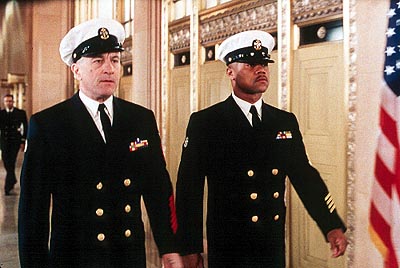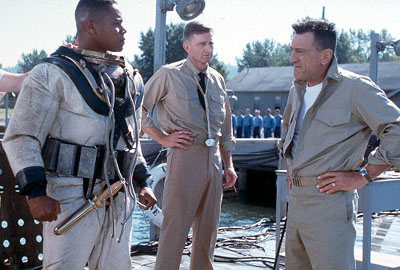

Most movies based on actual events invent characters or situations and add them to the movie to enhance the narrative and make it more watchable and suspenseful. Men of Honor strangely does the opposite. The story of Carl Brashear is very inspirational. Brashear fought institutional racism to become the first African-American Master Diver in the United States Navy. On its own, Brashear's story is more than enough to capture the sympathy and rapt attention of the audience, adding in the fictional character of Billy Sunday just makes things strange. Sunday (Robert De Niro, The Adventures of Rocky and Bullwinkle, Meet the Parents) is an aggregation of what it is to be a bigot. He hates Brashear (Cuba Gooding, Jr., Instinct, The Chill Factor) only because of his color, but Brashear's talent and determination slowly change his attitudes.
The story fast-forwards through Brashear's youth as a poor farm boy. He enlists in President Truman's newly desegregated army, only to end up as a cook. Nevertheless, nobody can tell Brashear what to do. He decides to go swimming with some white soldiers, and ends up demonstrating his swimming prowess. He sees Sunday and immediately decides he wants to be a Navy diver. It takes him a tremendous amount of work, but he finally makes it into the prestigious Navy diving school, only to face racism anew. The bulk of Scott Marshall Smith's script focuses on his time here, under the iron fist of Sunday. Sunday is no longer a diver because of some brash actions that saved lives. Needless to say, Brashear's time at the school is not easy. Sunday does everything in his power to cause Brashear to fail, but deep inside, Sunday is a man of honor. He can recognize that Brashear has amazing talent, and this realization slowly has him come to Brashear's side. The last act of Men of Honor reunites the two later in life as they fight one last battle, this time together.
De Niro and Gooding are both respected actors, but only do so-so work here. Charlize Theron (The Legend of Bagger Vance, The Yards) also has a useless small role here. The inclusion of her character (also fictional) adds nothing to the film. The best role goes to Aunjanue Ellis (Map of the World, In Too Deep), who plays Brashear's girlfriend and eventual wife. Carl Lumbly (How Stella Got Her Groove Back) is also good as Brashear's father, the source of Brashear's inspiration. He is determined that his son has a better life, and instills in Brashear vigor and drive that lasts throughout his lifetime. Still, Lumbly, like everybody else, plays characters that are very predictable. They think and act somewhat simplistically, most either on Brashear's side or against him. Gooding displays either wide-eyed optimism or furrowed brow determination. De Niro just has an annoying accent.
Instead of building a gradual sense of drama, director George Tillman Jr. (Soul Food) goes all out at every opportunity. The first attempt at eliciting tears comes less than ten minutes into the movie. From that point on, Tillman does all he can to make the audience weep. The scenes just don't carry enough emotion to bring anyone to tears. The fact that the outcome is already known and the Sunday character is merely a narrative device also puts a damper on things. Brashear's story still manages to seep through all unintentional attempts to dramatize it. With a life so inspiring, there really is no need to add to it, and as Men of Honor proves, it only makes things worse.